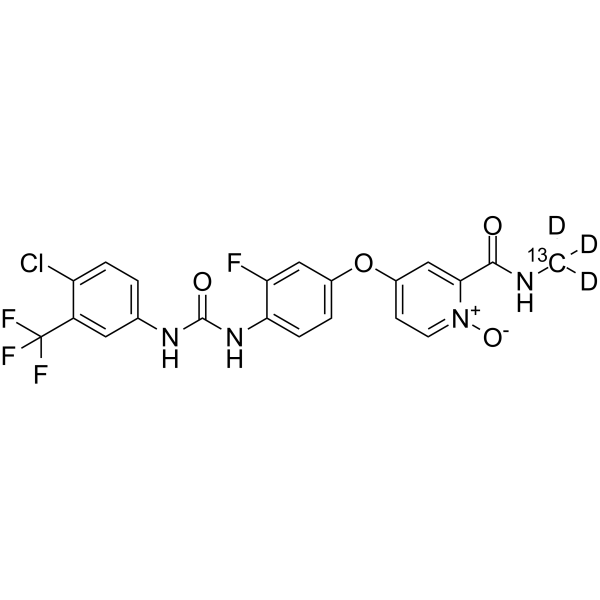Regorafénib N-oxyde (M2)-13C,d3
Modify Date: 2024-01-11 17:41:31

Regorafénib N-oxyde (M2)-13C,d3 structure
|
Common Name | Regorafénib N-oxyde (M2)-13C,d3 | ||
|---|---|---|---|---|
| CAS Number | 2140317-01-5 | Molecular Weight | 502.83 | |
| Density | N/A | Boiling Point | N/A | |
| Molecular Formula | C2013CH12D3ClF4N4O4 | Melting Point | N/A | |
| MSDS | N/A | Flash Point | N/A | |
Use of Regorafénib N-oxyde (M2)-13C,d3Regorafénib N-oxyde (M2)-13C,d3 is the 13C- and deuterium labeled. Regorafénib N-oxyde M2 is an active metabolite of Regorafenib. Regorafenib is a multi-target inhibitor for VEGFR1/2/3, PDGFRβ, Kit, RET and Raf-1 with IC50s of 13/4.2/46, 22, 7, 1.5 and 2.5 nM, respectively. |
| Name | Regorafénib N-oxyde (M2)-13C,d3 |
|---|
| Description | Regorafénib N-oxyde (M2)-13C,d3 is the 13C- and deuterium labeled. Regorafénib N-oxyde M2 is an active metabolite of Regorafenib. Regorafenib is a multi-target inhibitor for VEGFR1/2/3, PDGFRβ, Kit, RET and Raf-1 with IC50s of 13/4.2/46, 22, 7, 1.5 and 2.5 nM, respectively. |
|---|---|
| Related Catalog | |
| In Vitro | Stable heavy isotopes of hydrogen, carbon, and other elements have been incorporated into drug molecules, largely as tracers for quantitation during the drug development process. Deuteration has gained attention because of its potential to affect the pharmacokinetic and metabolic profiles of drugs[90]. |
| References |
| Molecular Formula | C2013CH12D3ClF4N4O4 |
|---|---|
| Molecular Weight | 502.83 |